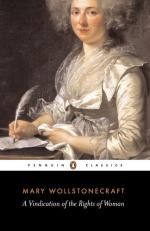|
This section contains 1,130 words (approx. 3 pages at 400 words per page) |

|
Historical Philosophies on Women
Aristotle predated the Christian West, but was the most esteemed of its philosophers from the Middle Ages to the Enlightenment. He contended that God created males with more life force and heat than females. In procreation, therefore, males were the agents of life, while females merely furnished growth materials. Male energy always intended to reproduce itself, but sometimes something went wrong. Then, because of a defect or weakness, a female was conceived (hence Wollstonecraft's reference to women as not being merely "fair defects").
Aristotle announced Femina est mas occasionatus—the female is an accident. He took the implications of the "defect" in female nature further, to examine its social implications. He claimed that whenever humans engaged in politics, the soul's qualities were called into play, and women's souls were not equipped for the public sphere. Aristotle repeatedly likened women to slaves, in that both...
|
This section contains 1,130 words (approx. 3 pages at 400 words per page) |

|




